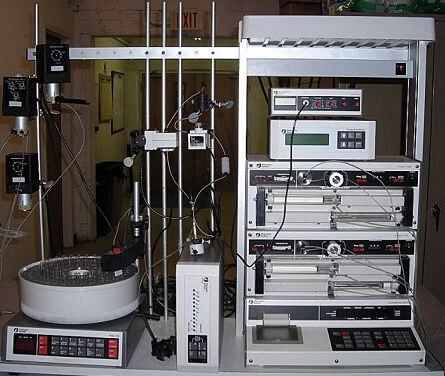Used PHARMACIA FPLC #109772 for sale
URL successfully copied!
Tap to zoom


ID: 109772
system
LCC 501 plus controller
(2) P500 pumps
UV MII detector
Conductivity detector
PH monitor
FRAC 100 collector
Computer
Software: under OS2.
PHARMACIA FPLC is a type of laboratory equipment used in the purification and analysis of proteins, peptides, and other substances. It stands for Fast Protein Liquid Chromatography and is used in transferring and separating liquid solutions. FPLC was initially developed and commercialized by Amersham PHARMACIA during the late 1980s and early 1990s. It is an adaptation of HPLC (High Performance Liquid Chromatography). In PHARMACIA FPLC, the solution is moved in columns to separate proteins and peptides which can then be identified and quantified. The system generally involves a chromatography system, pumps, columns, and detectors. Chromatography systems typically consist of two parts: the mobile phase and the stationary phase. Mobile phase moves constantly and it is a liquid solvent. The stationary phase is the adsorbent and it remains static. When it comes to pumps, there are different types for different purposes. These can be syringe pumps, high pressure pumps, or gear pumps. As for columns, there are also many different types. These can be traditional columns that contain stationary and mobile phases, radial and axial gradient columns, tangential flow filtration columns, and so on. Detectors are the other important element of FPLC. Different types of detectors can be used depending on the needs of the experiment. UV detectors, refractive index detectors, and mass spectrometers are all commonly used. The advantages of PHARMACIA FPLC include higher resolution, shorter run times, and higher capacity separation. It also has a wide range of applicable mobile and stationary phases and a wide variety of columns.Compared to traditional chromatography methods, FPLC is often more cost-effective and much faster. In a nutshell, PHARMACIA FPLC is a laboratory equipment designed for the purification, analysis and separation of different liquid components found in proteins, peptides, and other molecules. It involves chromatography systems, pumps, columns and detectors. The advantages of FPLC include higher resolution, shorter run times, higher capacity separation and its cost-efficiency.
There are no reviews yet